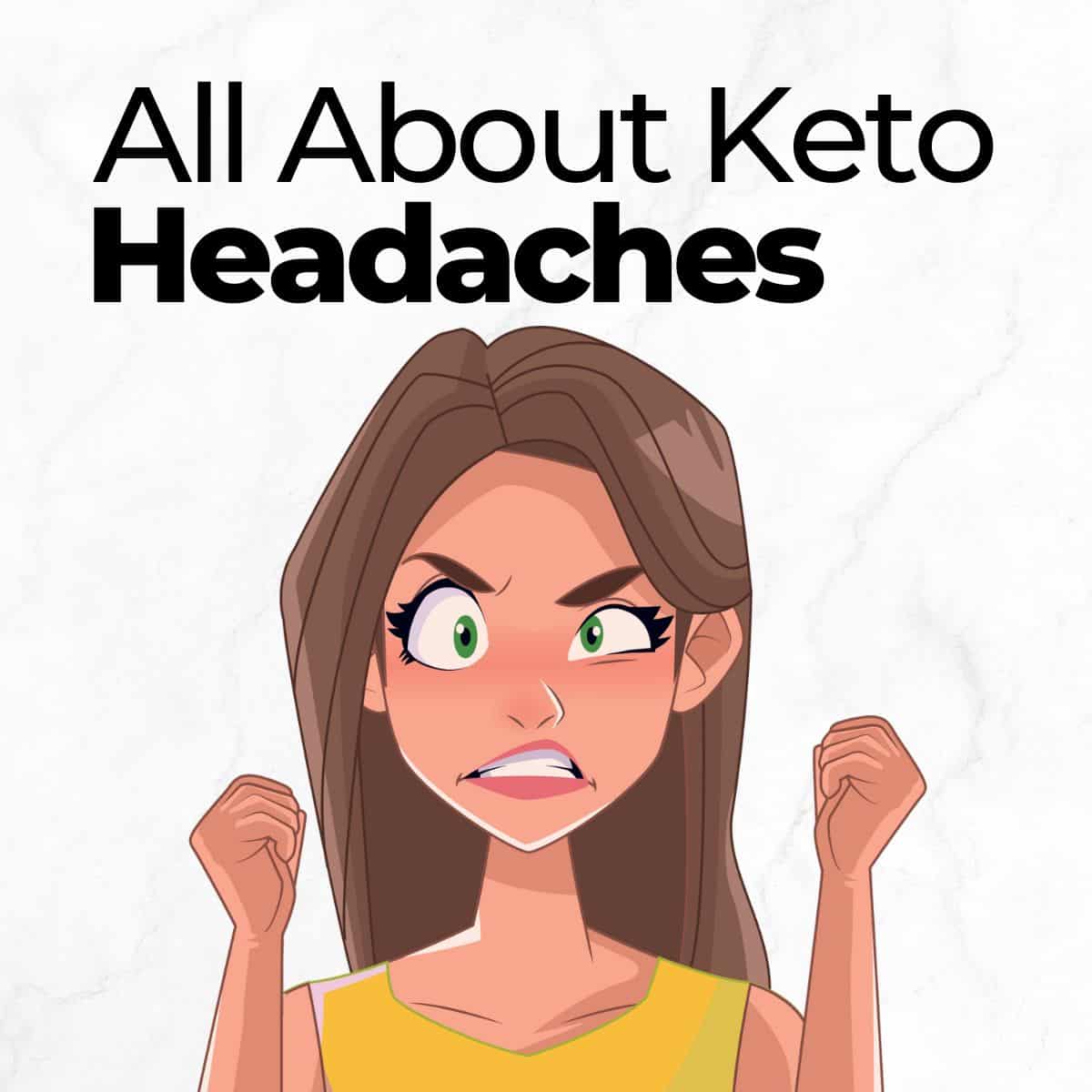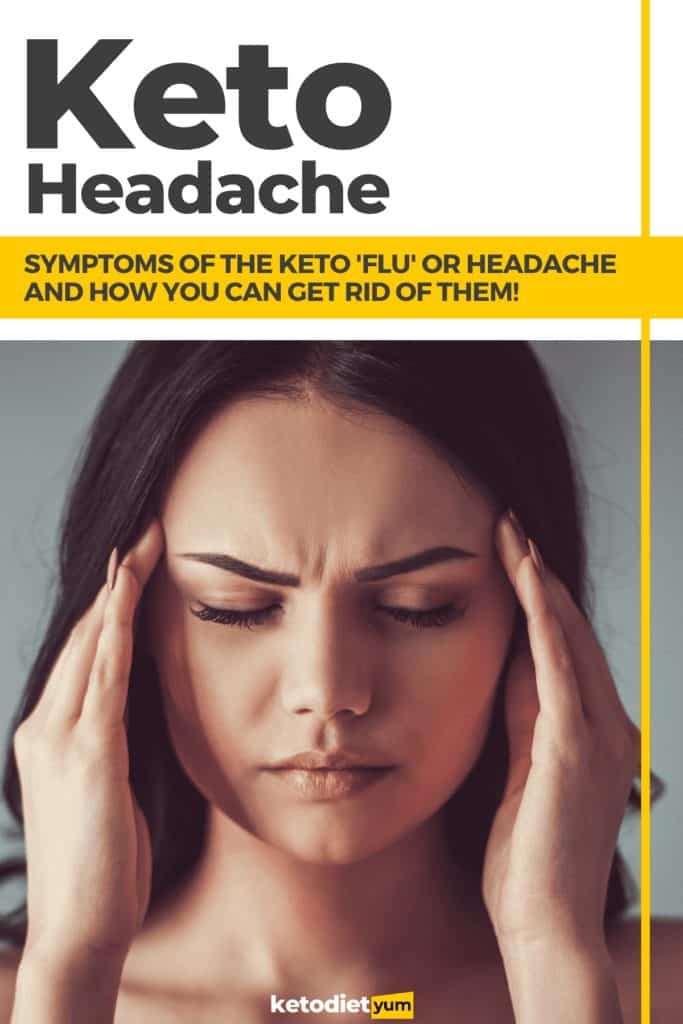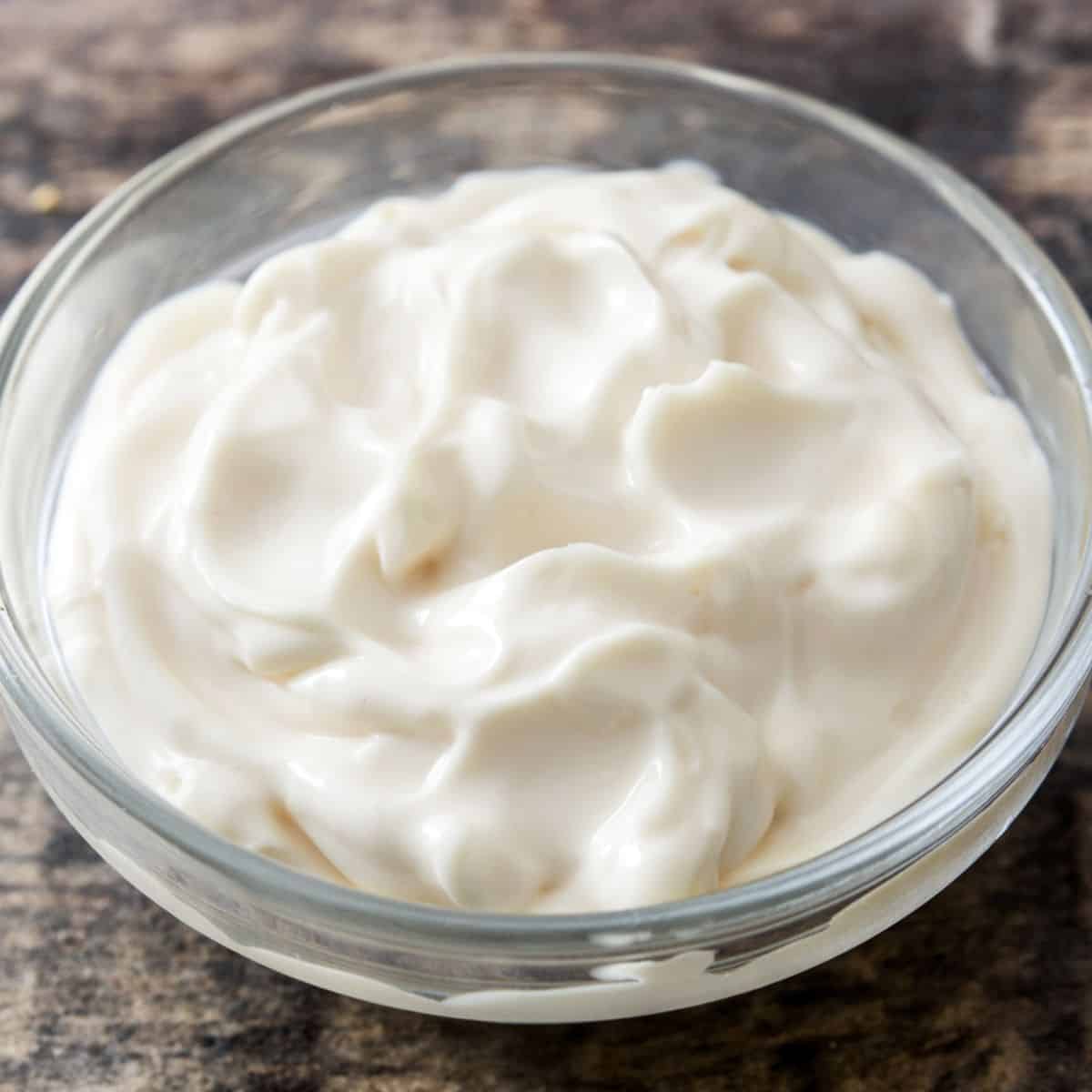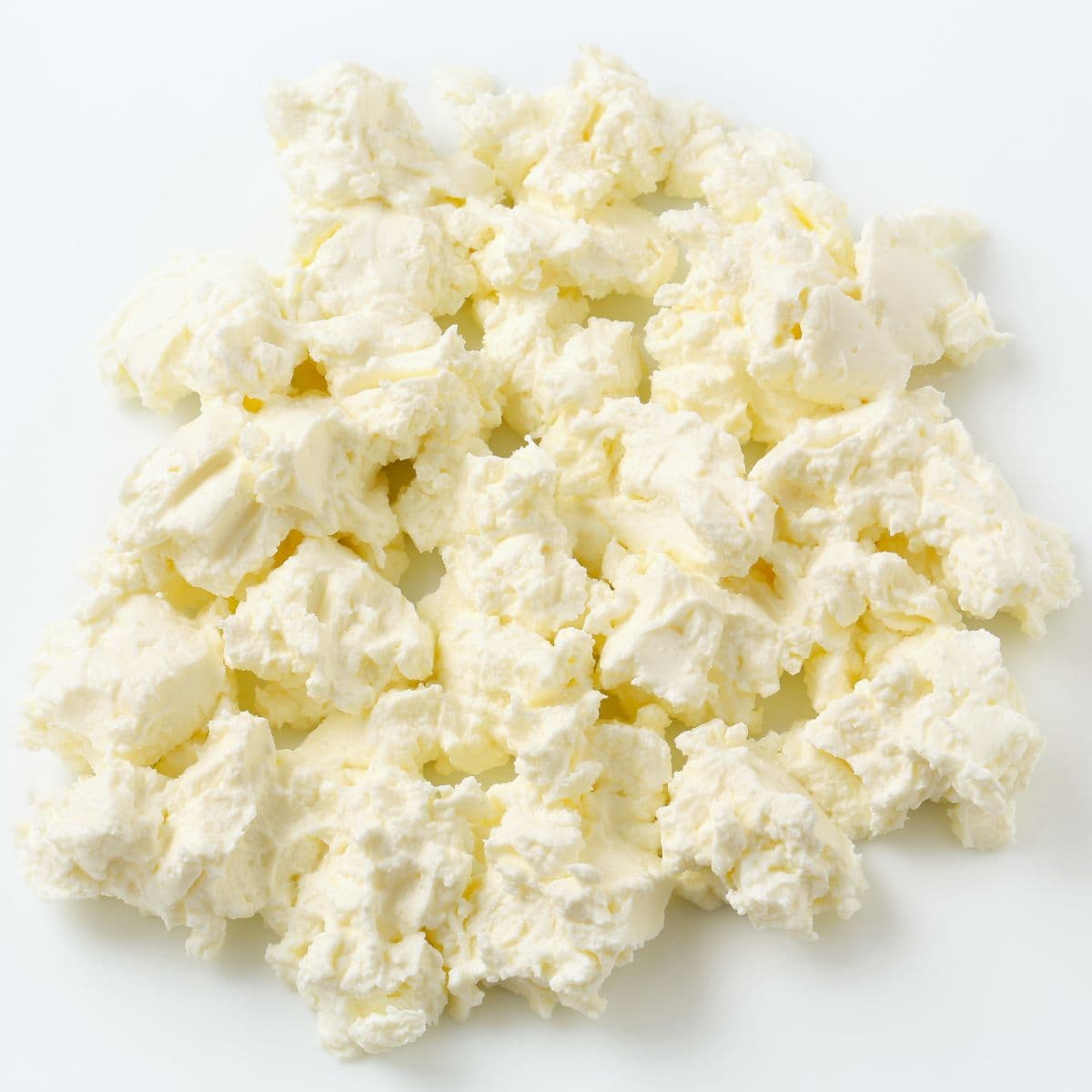A keto headache, also known as the keto flu, is one of the most common symptoms of going into ketosis. Let's learn how to get rid of them!

Jump to:
What Are Keto Headaches?
Keto headaches, or as we keto-heads call it, carb withdrawal.
Besides the obvious headache, keto flu can have other symptoms as well.
The most common is mental fog.
Basically, you'll feel as if you're about 20 IQ points lower than you actually are.
Other common symptoms are exhaustion and weakness.
Minus the high fever and vomiting, the term "flu" is accurate.
Why would anyone put themselves through this?
Simply put, keto flu is a part of going into ketosis and will go away with time.
But that doesn't mean there's nothing you can do.
In this guide, we'll talk about the causes of keto diet headaches and discuss some common strategies for dealing with them.
Just because it's a normal part of carb withdrawal doesn't mean you can't find some relief.
If you're experiencing a headache on keto after you're well into the diet, there may be something wrong.
In that case, we'll talk about how to find out what's wrong and what you can do to fix it.
We'll wrap up by discussing supplements and how they can help you manage your ketosis headache.
Let's get started!
Starting the Keto Diet & Mental Fog
One of the first things many people experience on the ketogenic diet is mental fog.
You may feel sleepy, have trouble focusing, get easily distracted, or even become irritable.
A problem that would take ten seconds to figure out may leave you scratching your head for a full minute.
Congratulations! You're going into ketosis.
No, seriously.
Mental fog is a sign that your diet is working as intended.
The reason is that your body is going through glucose withdrawal.
While most of your brain cells can function just fine without glucose - and your liver will produce enough glucose for the rest - there's a period of time as you go into ketosis where your liver is not yet converting fat into ketones.
Without glucose or ketones, your brain is literally starving for energy.
As a result, your brain cells are working more slowly than normal, and you're experiencing mental fog.
This is normal, and there's absolutely nothing to be worried about.
Unfortunately, many people aren't aware of the side effects of starting the ketogenic diet and can become understandably worried when their mental function begins to suffer.
After learning this, many people try to wean themselves off carbs instead of going cold turkey.
It makes sense.
After all, you're suffering from withdrawal.
Don't people get themselves through withdrawal by weaning themselves?
This may be a good strategy for an alcoholic or for someone who's trying to eat healthier in general, but it's a bad strategy for managing the side effects of carb withdrawal.
The reason is that your brain has only two alternatives for energy: glucose and ketones.
If you're getting fewer and fewer carbs but not few enough to go into ketosis, you'll still experience symptoms, and they'll last as long as it takes for you to get into ketosis.
The best thing to do is to go cold turkey and get through it as quickly as possible.
Can Ketosis Cause a Keto Headache?
Ketosis itself can't cause a keto headache.
However, Ketosis can lead to dehydration, which causes headaches.
When you're in a ketogenic state, your body will tend to excrete more electrolytes than normal.
This is why most doctors and dieticians recommend for people to take an electrolyte supplement and eat plenty of salt when they're on the keto diet.
The more electrolytes you're excreting, the more water your kidneys will need to expel to get the job done.
Basically, when you're on the ketogenic diet, you're going to pee a lot.
This is why people oftentimes lose a lot of weight in their first few days of keto.
They're not burning 10 pounds of fat in a week.
That would be ridiculous.
They're losing water weight.
On the plus side, this can make you feel encouraged about your new diet.
Who doesn't appreciate being lighter on their feet or being able to see their abs for the first time in who knows how long?
On the downside, this can lead to dehydration if you're not drinking enough water to compensate.
This probably won't come as a surprise, but you're supposed to carry some amount of water weight.
If you're not, your body will become dehydrated.
This can lead to tightness as your muscles literally dry out and constrict.
The first place you'll notice these effects are around your head, where dozens of small muscles control movement and facial expressions.
When these muscles tighten, you get a nasty tension headache that doesn't respond to over-the-counter painkillers like Tylenol.
A good rule of thumb is to drink enough water so that your urine is pale yellow.
There's no need to drink glass after glass of water until your stomach is ready to burst.
But if your urine is orange, you need to drink more water.
What Are the Leading Causes of Headaches From the Ketogenic Diet?
Besides dehydration, there are several possible causes of keto flu.
Let's take a look at each of them.
1. Sodium Deficiency
We all grew up learning that salt is a bad thing, and this can be a hard prejudice to overcome.
The fact is, our bodies need salt.
It's so important to our health that the Romans used to pay their legions in salt.
They called this kind of payment a "solarium," which is based on the Latin word for salt.
That's where the word "salary" comes from.
The only reason our society thinks salt is bad is that it's a cheap, easy way to flavor food.
As a result, our diets are chock full of it, especially if you're eating a lot of processed foods or fast food.
Barring that kind of salt overkill, it's easy to not have enough salt.
This is worsened by the fact that, as we already mentioned, your body excretes more electrolytes when you're in a ketogenic state.
So load up on that salt!
Sprinkle it on your breakfast, lunch, and dinner.
It adds flavor to even the blandest food, and you need it to stay healthy.
2. Sugar Withdrawal
We've talked about carb withdrawal as if it's a joke, but it really isn't.
Studies on both humans and animals have shown that we can become addicted to sugar, just as we can become addicted to drugs.
And like drugs, sugar withdrawal can cause flu-like symptoms.
If you don't believe us, think back to the last time you had a really bad day.
Did you eat some ice cream?
Or maybe you loaded up on pasta or pizza?
Perhaps a big cup of fountain soda?
There's a reason for that.
Sugar makes you feel good, particularly if you're addicted to it.
In nature, this is a healthy thing.
Our ancestors didn't have a lot of access to sugary foods, and the foods they did have access to - fruits and berries - were only around for a short season and were rich in nutrients.
It's no wonder our bodies evolved to crave carbs!
And with the sheer quantity of carbs available in today's world, it's no wonder most of us are addicted.
Worse yet, withdrawal can cause your body to produce high levels of cortisol.
This is commonly referred to as the body's "stress hormone".
It makes you feel anxious and is designed to make you get up and solve your problems.
Of course, if the problem is sugar addiction, the last thing you want to do is to solve it by eating a bunch of carbs.
Depending on how bad your sugar addiction is, symptoms can last from a few days to a few weeks.
The only solution here is to stay strong.
It will pass, eventually.
3. Hypoglycemia
Hypoglycemia is the medical term for low blood sugar.
And normally, it's a very bad thing.
Diabetics have to watch out for this condition since there's a fine line between too much blood sugar and not enough blood sugar.
Hypoglycemia can result in confusion, shakes, dizziness, mental fog, exhaustion, and muscle aches.
In other words, a lot of the symptoms of keto flu.
Of course, if you're on the ketogenic diet, you want to have low blood sugar.
This is another problem that should disappear after you've transitioned into ketosis.
Once your liver is converting fat into ketones, the cells in your body that depend on glucose will have an alternate energy source, and you should feel just fine.
4. Caffeine Withdrawal
We've talked about sugar withdrawal, but did you know that caffeine is also an addictive drug?
As anyone who's developed a Starbucks habit can attest, it very much is.
The symptoms of withdrawal include exhaustion, mental fog, and, yes, headaches.
A lot of people don't like black coffee, so they quit drinking it when they go on the ketogenic diet.
On its face, this can seem like a good idea since both sugar and milk are not keto-friendly.
Thankfully, there's a ketogenic way around this.
If you absolutely must have something sweet, try a keto-friendly sweetener like Swerve, along with some heavy cream in your morning coffee.
This can be just as satisfying as the coffee you used to drink and will keep your caffeine withdrawal symptoms at bay.
An even better method is to start your day with bulletproof coffee.
While a lot of companies market special, "bulletproof" coffee beans at several times the price of commercial coffee, that's unnecessary.
A good recipe is 16 ounces of black coffee, 2 tablespoons of butter, 2 tablespoons of heavy cream, and 2 tablespoons of coconut or MCT oil.
Put all the ingredients in a blender.
If you don't, the oil will rise to the top, and it will be disgusting.
Blend it all up, and you have a rich breakfast coffee with a whopping 500 calories of fat.
It's delicious, it's caffeinated, and it's 100 percent keto-friendly.
5. Not Enough Calories
A lot of people go on the ketogenic diet to lose weight.
If that's your goal, wouldn't you want to cut calories?
Yes, you would… eventually.
Going into ketosis puts your body under a lot of stress.
Cutting calories only puts it under more stress.
Doing both at the same time is a recipe for keto flu, as your body struggles to deal with all of these changes coming at it at once.
For the first couple of weeks of your diet, eat until you're full.
You can cut calories later if you need to.
But the beginning of your diet should be about getting used to ketosis, not piling more demands on your already-taxed body.
How Long Does A Keto Headache Last?
If you've followed all the advice in our last section and you're staying well-hydrated, a keto headache shouldn't be a serious issue.
The mental fog is the hardest thing to get through since it's a result of your body not producing enough ketones for your brain.
This will only go away once you've gone into ketosis.
Achieving this takes most people about 3 to 7 days, although up to 10 days is considered normal.
If you've been on the ketogenic diet for longer than that and you're still experiencing mental fog, you're probably eating too many carbs and failing to go into ketosis.
Go over your meal plan thoroughly, and look at all the ingredients.
Anything store-bought should be suspect.
Carbs can hide where you least expect them.
For example, a few tablespoons of salad dressing that has corn syrup in it can keep you from going into ketosis - or knock you out of it, if you've already gotten there.
Another common cause of lingering keto flu is a lack of exercise.
We've already talked about this, but it bears repeating.
If you're not burning the carbs you eat, your body is going to use them to fuel your brain.
This can lead to continued carb withdrawal symptoms.
Can Supplements Help a Keto Headache?
Supplements are an essential part of any ketogenic diet.
We're not just talking about electrolytes, either.
The keto diet is great for weight loss, epilepsy, and some cancers.
What it's not good for is providing a balanced diet rich in nutrients.
Most B vitamins are found in grain and other carbohydrate-rich foods.
Since you're cutting carbs out of your diet, you'll need to take a B-vitamin supplement.
Make sure it's full-spectrum because B vitamins need to be taken in the right proportions to be fully effective.
You'll also want to make sure you're taking sugar-free supplements so you don't undermine your diet with a couple of pills.
Vitamin D is enough of a challenge for everybody, let alone people on the ketogenic diet.
Americans are so vitamin D deficient that milk, cereal, and other companies add it to their products.
Unfortunately, you won't be eating a lot of processed or fortified foods on your ketogenic diet, so you'll need to take supplements.
Besides pills, the best vitamin D supplement is natural sunlight!
As little as an hour of sunlight, a day can stimulate your body to produce enough vitamin D for its needs.
Finally, you'll need to take a calcium supplement.
Ketones are acidic, which upsets your blood's normal pH.
Since your body needs your blood to fall within a fairly narrow pH range, it will release calcium from your bones to neutralize the acid.
Needless to say, you don't want this to happen.
A calcium supplement can cut this disaster off at the pass, normalizing your blood's pH without the need for your body to deplete your bones.
Keto Headache Conclusion
As you can see, there are several possible causes for keto flu and just as many possible solutions.
Dehydration, electrolyte deficiency, sugar withdrawal, caffeine withdrawal, hypoglycemia, and calorie restriction can all play a role.
As a result, the proper treatment is going to depend on what exactly is causing your symptoms to begin with.
The first step in diagnosis is simple: how long have you been on a diet?
If it's within the first few days, your best bet is to wait things out, eat freely, drink plenty of water and take some electrolyte supplements.
If it's far into the diet, the problem is almost certainly electrolyte deficiency.
This is something you'll want to address immediately, not just because of your keto headache but also for your general health.
We've also seen that there are a variety of symptoms.
Not everyone's keto flu is the same, which can help with diagnosis.
If you're just getting a keto headache, the problem is probably electrolytes.
If you're experiencing overall physical weakness, your calorie intake may be to blame.
Managing your keto flu can feel like a game of whack-a-mole.
But once you hit the right target, you'll find it's well worth it.
And you'll be on your way to a healthier lifestyle.





